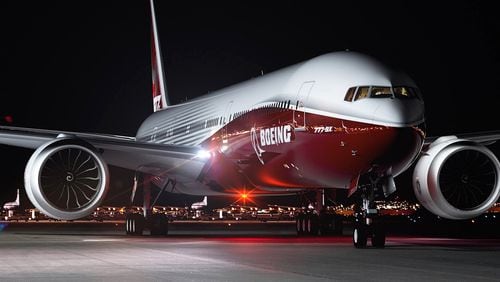Recent major Georgia jobs recruitment efforts and promised jobs
Caterpillar — 1,400
Baxter International — 1,500
General Motors IT center — 1,000
Engineered Floors — 2,400
Source: Staff research
Major Georgia manufacturing sectors
Food manufacturing – 60,901 jobs
Transportation equipment (including automotive and aerospace manufacturing) – 44,549 jobs
Textile product mills – 26,235
Fabricated metal products – 25,246
Machinery manufacturing – 20,307
Sources: Georgia Department of Economic Development, state Department of Labor, Workforce Statistics & Economic Research. Numbers as of second quarter 2013.
What is the Boeing 777X?
Boeing bills the 777X as “the largest and most-efficient twin-engine jet in the world,” using less fuel and offering lower operating costs than competitors. The planes can seat up to 400 people and travel as much as 9,300 nautical miles, depending on configuration. The 777X can play an important role for Delta and other carriers that have invested heavily in long-haul international routes that can generate lucrative revenue from business travelers.
MyAJC.com
How do Georgia’s economic measures stack up against the nation’s? Our interactive graphic makes the comparison.
Georgia has joined a flock of states and possibly foreign governments eager to land thousands of jobs to build Boeing’s next-generation 777X jetliner, entering a bidding war that could rise into the billions of dollars in incentives.
The frenzy to win all or part of the massive twin-engine jet’s construction will pit job-hungry states against neighbors, and American manufacturing bona fides vs. those of rival nations. It also raises questions for lawmakers and taxpayers whether massive amounts of public money and tax breaks will be worth the jobs potentially gained.
Should Georgia be successful in landing all or even a piece of the 777X, it could be a manufacturing trophy for the state that rivals peaches, peanuts, CNN and Coca-Cola as one of Georgia’s trademark products.
Once a foregone conclusion that Washington state would win the business, Boeing put work on the 777X up for grabs after a dispute with its machinists union.
In the process, Boeing has ignited an arms race.
Washington state offered nearly $9 billion in tax incentives alone to Boeing for the new jet, and Missouri lawmakers have approved up to $1.74 billion in incentives if the Chicago-based conglomerate were to assemble the airliner and create 8,000 jobs, according to The Associated Press. Alabama, North Carolina, South Carolina, Utah, Wisconsin are among the states reportedly making bids.
Boeing, according to a report in The St. Louis (Mo.) Post-Dispatch, wants governments to provide potentially $10 billion in land and manufacturing facilities at low or no cost. In addition, it wants a location with access to major roads, rail, a seaport and an “immediately adjacent” international airport. Boeing also wants significant tax breaks.
Boeing has essentially turned the 777X program into a global auction, said Brent Lane, the director of the Carolina Center for Competitive Economies at the University of North Carolina.
That way, it can extract a better deal either from Washington and Boeing’s workers or other places, Lane said.
“Will someplace be induced to pay more than they should? Yes,” he said. “That’s the purpose of an auction.”
Gov. Nathan Deal told The Atlanta Journal-Constitution on Friday that the state intends to make a proposal. Deal and other officials declined to discuss specifics of the state’s pitch. He called Boeing’s request for proposals “very broad and general, but there’s some indication that Boeing is willing to do the project in phases,” the governor said.
“So we are going to submit the proposal and hopefully we are going to be hearing something soon,” he said. “We are very encouraged.”
Deal said the proposal is due Tuesday and state officials were working furiously to meet it. As a result, Georgia has thrust itself into what could be its biggest jobs recruitment effort since Kia Motors.
But the payoff for winning Boeing is huge, recruiters say. In addition to possibly more than 8,000 Boeing jobs, recruiters lust after thousands of jobs with suppliers.
Aerospace is coveted because the industry creates high-paying jobs for skilled workers from engineers to welders. The median annual pay in Georgia for aerospace product and parts manufacturing jobs was $65,800 in 2012, according to the U.S. Bureau of Labor Statistics.
The payoff also is high for the winning state’s image. Just as the reach of Georgia-based brands such as Coke and CNN are global, so too is the range and impact of the 777X. Potential customers for the plane are airlines around the world.
But the business of building jets is volatile. Demand for military, corporate and commercial jets — and therefore manufacturing employment — can yo-yo with economic trends. Georgia has seen as much with the employment booms and busts at Cobb County’s Lockheed Martin plant.
Georgia has battled for years for aerospace jobs. It saw major success with recent expansions by business jet maker Gulfstream in Savannah. This week, Georgia officials went to a major aviation forum in Germany.
The pitch to aerospace firms, and conceivably Boeing, is that Georgia is home to Hartsfield-Jackson International Airport, the world’s busiest, and is the headquarters of one of the world’s largest airlines. Atlanta-based Delta Air Lines, a major Boeing customer, owns or leases more than 400 Boeing jets and plans to buy more over several years.
Georgia also boasts military aviation outposts such as Robins Air Force Base in Middle Georgia and Dobbins Air Reserve Base in Cobb County. The state has fast-growing ports in Savannah and Brunswick, an extensive rail and interstate system, research institutions such as the University of Georgia and Georgia Tech, and more than 500 aerospace companies, including Lockheed and Gulfstream.
The aerospace industry is responsible for about 2.4 percent of Georgia’s gross domestic product, and it is a $10 billion-a-year business for the state, according to a 2010 report by the consulting and auditing firm Deloitte.
Georgia, like other Southern states, has fewer unions and “right-to-work” laws that make union organizing more difficult. Labor and land costs in the South also are generally lower.
The race to win Boeing’s business opened when the manufacturer’s machinists in Washington state rejected a company offer of job stability in exchange for smaller annual raises and pension cuts.
Georgia economic development officials have tried to leverage the I-95 corridor as a prime spot for aerospace suppliers, given its connectivity to Boeing in South Carolina, Gulfstream in Savannah and Embraer in Florida, as well as the Savannah and Brunswick ports. There also could be other locations that Georgia could pitch.
But Georgia faces challenges, including concerns about public schools and gridlock in metro Atlanta. There’s also the question of whether the state will be able to pony up enough cash, tax breaks and facilities to attract Boeing.
Some of Georgia’s biggest competitors could be its neighbors. In recent years, South Carolina landed a Boeing plant, one of two in the U.S. where the company’s 787 Dreamliner is finished, and Alabama won a plant from Boeing’s chief rival, Airbus.
Lane, the University of North Carolina researcher, said Boeing likely has a short list of locations in mind that meet specific needs, such as infrastructure, transportation access, labor and potentially a location with a dedicated runway.
He said it is “entirely likely they’ll go to a place that’s not the top bidder” because of specific requirements.
Companies like Boeing also have become more global. The sophisticated wing of Boeing’s Dreamliner is made in Japan. Other aircraft manufacturers also have positioned factories and suppliers around the world.
The 777X debuted at the recent Dubai Air Show, and Boeing racked up more than 200 orders for the aircraft, which is expected to begin service in 2020. The list price tops out at more than $375 million per plane.
About the Author







